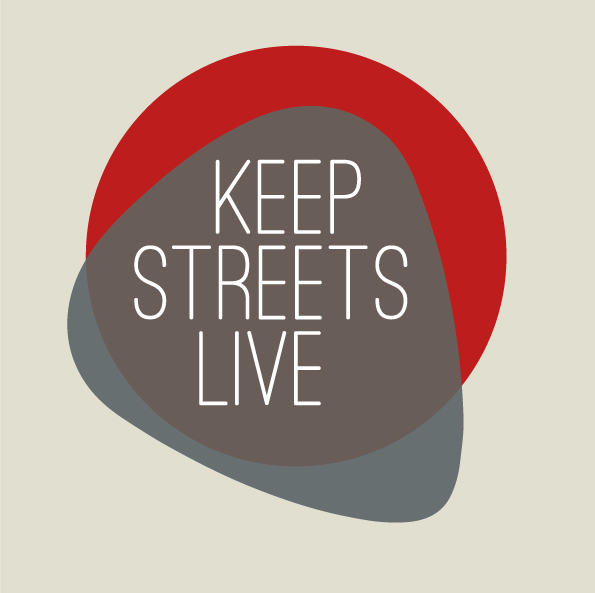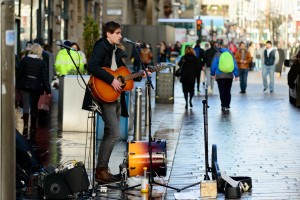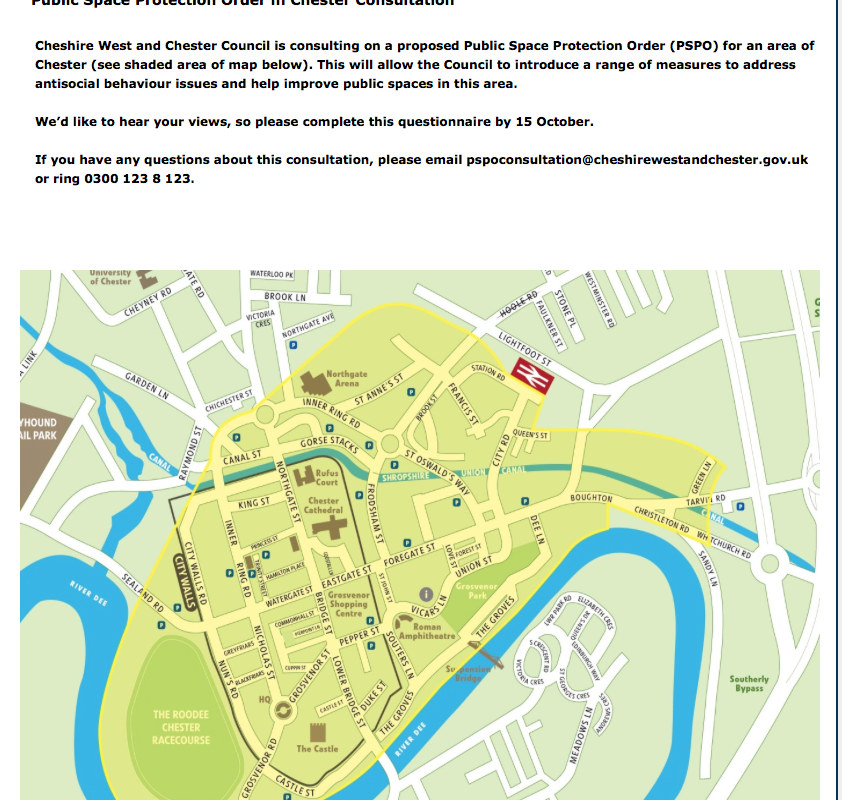We urgently need people to complete Chester and Cheshire West Council’s online PSPO consultation and to express their opposition to the police and private business group Chester CH1 BID proposals to criminalise street culture
The Campaign against the Criminalisation of Street Culture in Chester

Nearly 7000 people have so far signed our petition against the proposal of Chester and Cheshire West Council to introduce a ‘Public Space Protection Order’ (PSPO) which, amongst other things would make it a criminal offence punishable by a £1000 fine to play music or sing songs in the street if you stand in the wrong place, for the wrong length of time and do not meet a quality assessment administered by the private business group Chester CH1. The proposed PSPO would also make it a criminal offence to ‘lie down or sleep in any public place‘, to feed birds and to beg using ‘verbal, non-verbal or written requests’. The proposals will have a hugely disproportionate effect upon vulnerable and dispossessed people in Chester, particularly the homeless and vulnerably housed as well as representing a direct assault on the spontaneity, informality and democratic access to public space for the arts and street culture that the Keep Streets Live Campaign exists to protect.
Online Consultation
Chester and Cheshire West Council are currently carrying out an online consultation on the proposals which ends on October 15. It is vitally important that people participate in this consultation whether they are Chester residents, visitors, tourists, buskers or people who care about civic freedoms, public space and social justice. The more people who take part in this survey and express their constructive opposition to these damaging proposals, the more chance we have of ensuring that they do not go through. The consultation will take between 10/20 minutes to complete depending upon the amount of detail you go into it. Your response will make a big difference to this campaign, so please find the time to do it if you can!
Link to the online consultation:
http://www.cheshirewestandchester.gov.uk/your_council/consultations_and_petitions/council_consultations/proposed_public_space_protecti.aspx
Link to the petition against the PSPO:
https://www.change.org/p/cheshire-west-and-chester-council-don-t-make-life-harder-for-the-homeless-don-t-criminalise-your-buskers
The PSPO proposal
The consultation covers seven entirely separate proposals, each of which would create a new criminal offence in the defined geographical area of the PSPO.
1.) Measure 1 – Introduction of a controlled alcohol zone
2.) Measure 2 – Deterring the use of intoxicating substances
3.) Measure 3 – Deterring public urination/defecation.
4.) Measure 4 – Deterring rough sleeping
5.) Measure 5 – Deterring begging
6.) Measure 6 – Restricting the feeding of birds
7.) Measure 7 – Deterring inconsiderate buskers
As you will see, many separate issues have been lumped together under the ever-expanding category of ‘anti-social behaviour’. The busking proposals are on part of a wider ‘catch-all’ approach to the oversight of Chester’s public spaces. The Keep Streets Live Campaign has not taken a public position on whether Measures 1-3 should be included on the PSPO though we have expressed a view on those measures. We are strongly opposed to the inclusion of Measures 4-7 on the PSPO for reasons we make clear later.
In general the PSPO is an authoritarian and clumsy ‘catch-all’ piece of legislation which creates the potential for arbitrary criminal offences to be created with will have a disproportionate impact upon the most vulnerable members of society. Our considered view is that enforcement action should only ever be taken as a last resort against people whose actions were causing genuine harm to other people and who had refused reasonable requests to stop.
We strongly encourage people to take part in this online consultation and to answer the questions as they see fit. We are publishing our answers as a reference for people and to explain our reasons for opposing the PSPO clearly. Please feel free to use our answers as a framework for your own responses. A text summary follows each screen grab for ease of copy/pasting .
Keep Streets Live Campaign official response to Chester PSPO consultation
Page 1
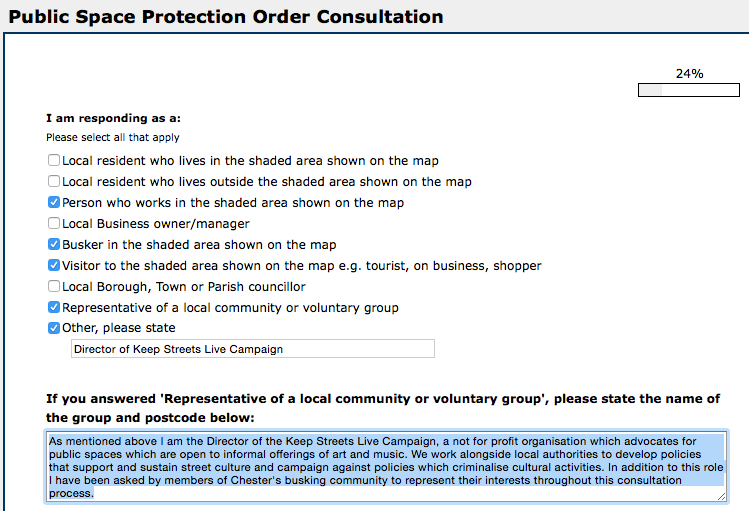
PSPO consultation
Text Summary
As mentioned above I am the Director of the Keep Streets Live Campaign, a not for profit organisation which advocates for public spaces which are open to informal offerings of art and music. We work alongside local authorities to develop policies that support and sustain street culture and campaign against policies which criminalise cultural activities. In addition to this role I have been asked by members of Chester’s busking community to represent their interests throughout this consultation process.
Page 2

Page 3

Page 4
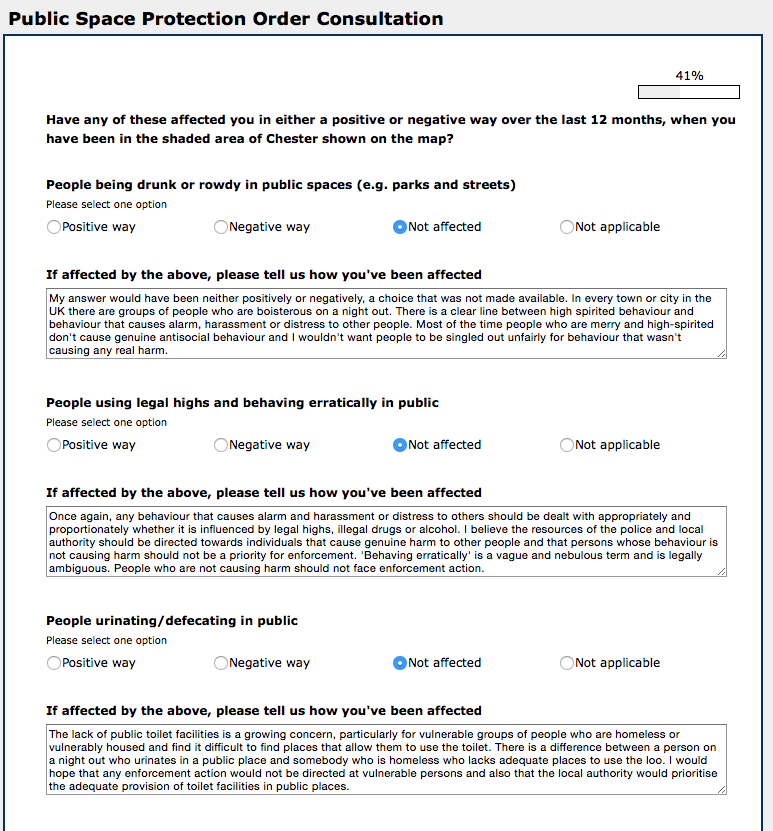
Text Summary
People Being Drunk/Rowdy
My answer would have been neither positively or negatively, a choice that was not made available. In every town or city in the UK there are groups of people who are boisterous on a night out. There is a clear line between high spirited behaviour and behaviour that causes alarm, harassment or distress to other people. Most of the time people who are merry and high-spirited don’t cause genuine antisocial behaviour and I wouldn’t want people to be singled out unfairly for behaviour that wasn’t causing any real harm.
People using legal highs/behaving erratically
Once again, any behaviour that causes alarm and harassment or distress to others should be dealt with appropriately and proportionately whether it is influenced by legal highs, illegal drugs or alcohol. I believe the resources of the police and local authority should be directed towards individuals that cause genuine harm to other people and that persons whose behaviour is not causing harm should not be a priority for enforcement. ‘Behaving erratically’ is a vague and nebulous term and is legally ambiguous. People who are not causing harm should not face enforcement action.
People urinating/defecating in public
The lack of public toilet facilities is a growing concern, particularly for vulnerable groups of people who are homeless or vulnerably housed and find it difficult to find places that allow them to use the toilet. There is a difference between a person on a night out who urinates in a public place and somebody who is homeless who lacks adequate places to use the loo. I would hope that any enforcement action would not be directed at vulnerable persons and also that the local authority would prioritise the adequate provision of toilet facilities in public places.
Page 5
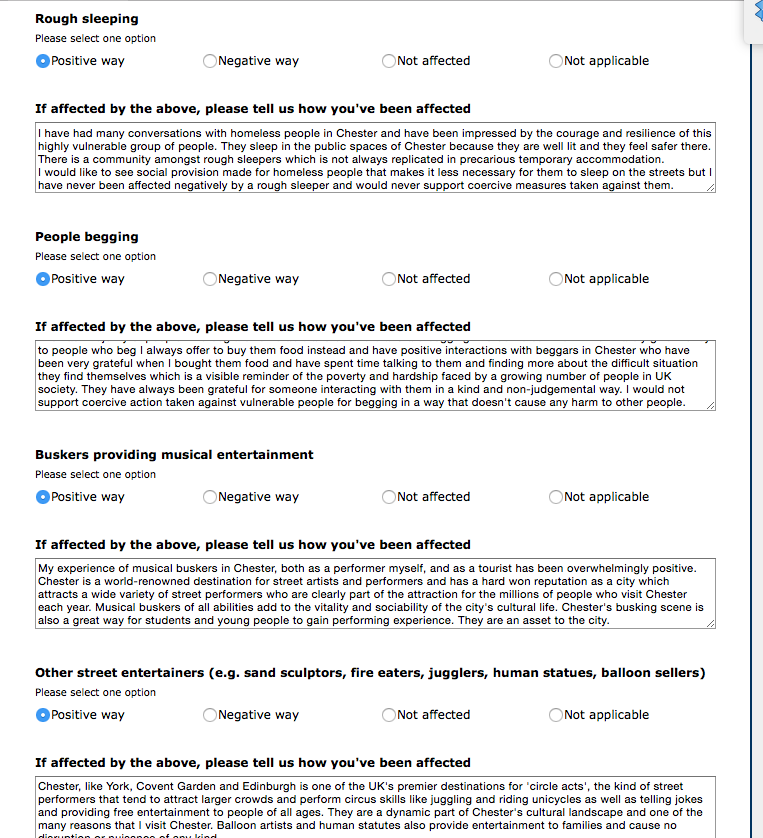
Text summary
Rough Sleeping
I have had many conversations with homeless people in Chester and have been impressed by the courage and resilience of this highly vulnerable group of people. They sleep in the public spaces of Chester because they are well lit and they feel safer there. There is a community amongst rough sleepers which is not always replicated in precarious temporary accommodation.
I would like to see social provision made for homeless people that makes it less necessary for them to sleep on the streets but I have never been affected negatively by a rough sleeper and would never support coercive measures taken against them.
People Begging
The vast majority of people who beg are vulnerable and destitute and are begging in order to survive. Whilst I don’t give money to people who beg I always offer to buy them food and have positive interactions with beggars in Chester who have been very grateful when I bought them food and have spent time talking to them and finding more about the difficult situation they find themselves which is a visible reminder of the poverty and hardship faced by a growing number of people in UK society. They have always been grateful for someone interacting with them in a kind and non-judgemental way. I would not support coercive action taken against vulnerable people for begging in a way that doesn’t cause any harm to other people.
Buskers providing musical entertainment
My experience of musical buskers in Chester, both as a performer myself, and as a tourist has been overwhelmingly positive. Chester is a world-renowned destination for street artists and performers and has a hard won reputation as a city which attracts a wide variety of street performers who are clearly part of the attraction for the millions of people who visit Chester each year. Musical buskers of all abilities add to the vitality and sociability of the city’s cultural life. Chester’s busking scene is also a great way for students and young people to gain performing experience. They are an asset to the city.
Other street entertainers (e.g. sand sculptors, fire eaters, jugglers, human statues, balloon sellers)
Chester, like York, Covent Garden and Edinburgh is one of the UK’s premier destinations for ‘circle acts’, the kind of street performers that tend to attract larger crowds and perform circus skills like juggling and riding unicycles as well as telling jokes and providing free entertainment to people of all ages. They are a dynamic part of Chester’s cultural landscape and one of the many reasons that I visit Chester. Balloon artists and human statutes also provide entertainment to families and cause no disruption or nuisance of any kind.
Page 6
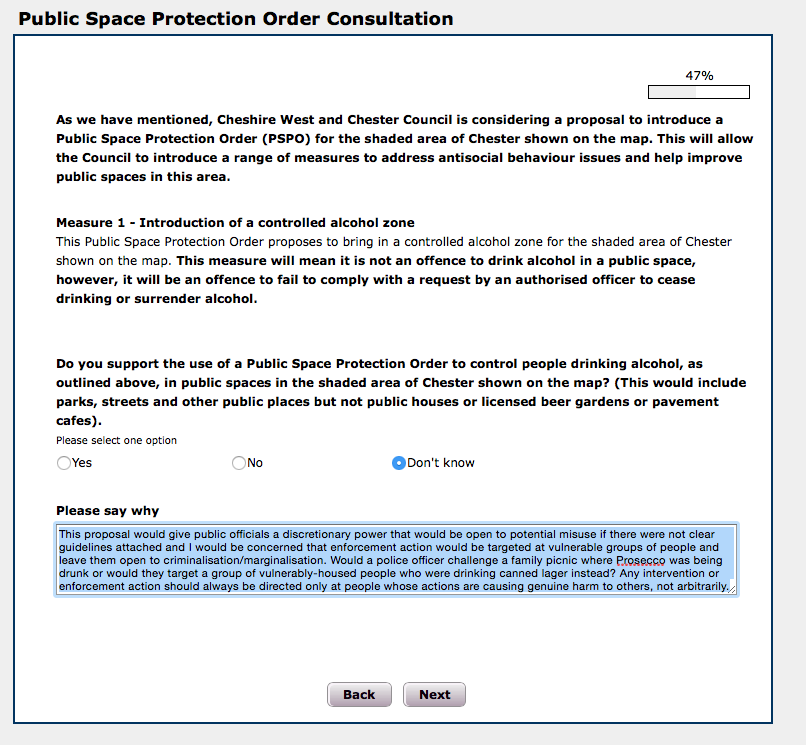
Measure 1
Text Summary
This proposal would give public officials and police officers a discretionary power that would be open to potential misuse if there were not clear guidelines attached and I would be concerned that enforcement action would be targeted at vulnerable groups of people and leave them open to criminalisation/marginalisation. Would a police officer challenge a family picnic where Prosecco was being drunk or would they target a group of vulnerably-housed people who were drinking canned lager instead? Any intervention or enforcement action should always be directed only at people whose actions are causing genuine harm to others, not arbitrarily.
Page 7

Measure 2
Text Summary
I am concerned about the impact of this measure against vulnerable people leading to criminalisation and marginalisation. The police and local authority have adequate powers to use against people whose behaviour causes alarm/harassment or distress towards other people. They can also use CPNs (Community Protection Notices) to target individuals whose behaviour is having a detrimental effect upon other people. I believe that a targeted approach, based on harm reduction and providing appropriate support to persons with addiction/mental health problems, is much better than blanket ban provisions of the sort proposed.
Page 8

Measure 3
Text Summary
I would want clear guidance to accompany any proposal that ensures that enforcement is not directed against vulnerable groups of people. The fixed penalty is fixed at £100 rising to £1000 if it goes to court with a criminal record. If a person is urinating because they are homeless and have no place to use the loo I don’t believe they should be criminalised or given a fine that they will be unable to pay. This is a different matter entirely from someone who is on a night out and urinates in a public space.
Page 9

Measure 4
Text Summary
It shouldn’t be necessary to complete an online survey to explain why these proposals are not only wrong, but also highly unethical. People who sleep rough are amongst the most vulnerable members of our society and subject to violence, harassment alongside the many other difficulties they face on a daily basis. Many choose to sleep in well lit public places because they feel safer there and are amongst people they know. Criminalising rough sleeping in the defined area may well cause people to find other, less safe areas where they could be subject to assault and victimisation. Furthermore, there is no evidence that coercive measures are an effective way of getting people to engage with support services. Some people might ‘choose’ to sleep rough because they feel unsafe in their temporary accommodation or because they are trying to get away from people who are using drugs or alcohol. There is absolutely no justification for enacting a PSPO which incorporates rough sleeping. The local authority should concentrate on providing adequate support services for all people, but even if there were safe and available beds for all homeless people (there aren’t), it would still be unethical and, unlawful, to criminalise people for sleeping rough.
Page 10

Measure 5
Text Summary
These measures will clearly affect the most vulnerable in Chester and should not be included in the PSPO. People asking for food or money because of desperate poverty should not face criminalisation and punitive fines that they could not reasonably be expected to pay. The proposed measure is ‘catch-all’ in nature by incorporating ‘verbal, non-verbal or written requests’. This will affect people who cause no harm or interference to other people. Enforcement action should only ever be directed against persons who behave in a way that causes alarm, harassment and distress to other people. Adequate powers to already exist.
Page 11
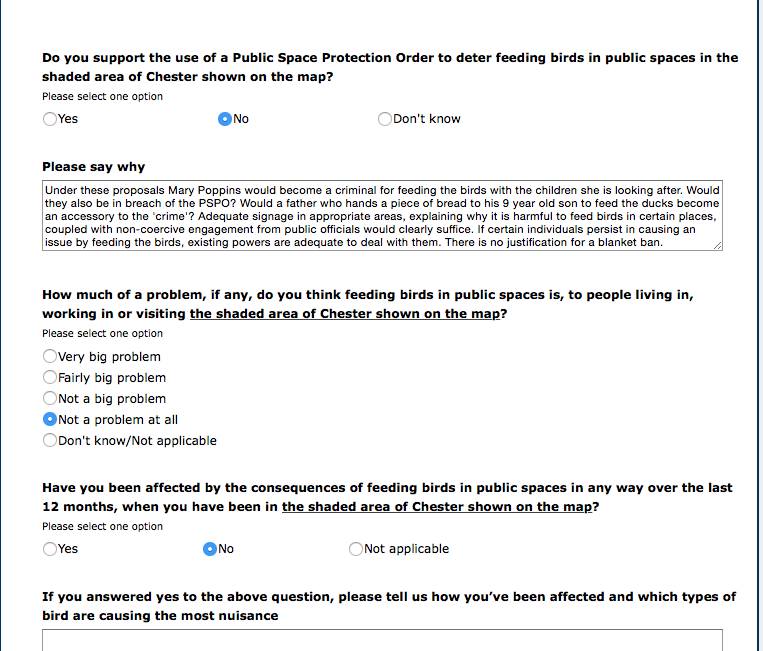
Measure 6
Text Summary
Under these proposals Mary Poppins would become a criminal for feeding the birds with the children she is looking after. Would they also be in breach of the PSPO? Would a father who hands a piece of bread to his 9 year old son to feed the ducks become an accessory to the ‘crime’? Adequate signage in appropriate areas, explaining why it is harmful to feed birds in certain places, coupled with non-coercive engagement from public officials would clearly suffice. If certain individuals persist in causing an issue by feeding the birds, existing powers are adequate to deal with them. There is no justification for a blanket ban.
Page 12

Measure 7
Text Summary
The proposed PSPO would make it a criminal offence to sing or play musical instruments without permission, in the ‘wrong’ locations, and for the ‘wrong’ length of time. Under the proposals you could be committing a criminal offence, even if your actions were not causing any harm or annoyance to any person. People could face fines of up to £1000 and a criminal record just for singing on the street. This is arbitrary and constitutes a misuse of the law. It would damage spontaneity, deter high quality travelling performers from coming to Chester, deter students and young people from starting busking in the first place, damage relationships between police and the wider community and create an irrational obligation to enforce against people who are not causing any harm.
The option that asks the council to work on a new Code of Practise is a much better way of building good relationships of cooperation between local businesses, residents and the busking community. It would preserve the informality, spontaneity and democratic access to public space that is so intrinsic to busking whilst setting clear expectations for all those busking in Chester. Crucially, enforcement action under the code of practice approach would only be directed at those persons whose behaviour had caused actual harm to others. This would enable the local authority to target inconsiderate buskers whose actions not only cause problems for businesses and residents, but also other buskers, without creating a blanket ban which affects ALL buskers, regardless of harm caused. The council can use Community Protection Notices (CPNs) to target individuals whose behaviour is unreasonable, persistent and having a detrimental effect on the locality. This collaborative and targeted approach is much more appropriate for the oversight of a cultural activity such as busking, and, crucially, would have the consent and cooperation of the busking community and professional bodies such as Equity and the Musician’s Union.
Page 13
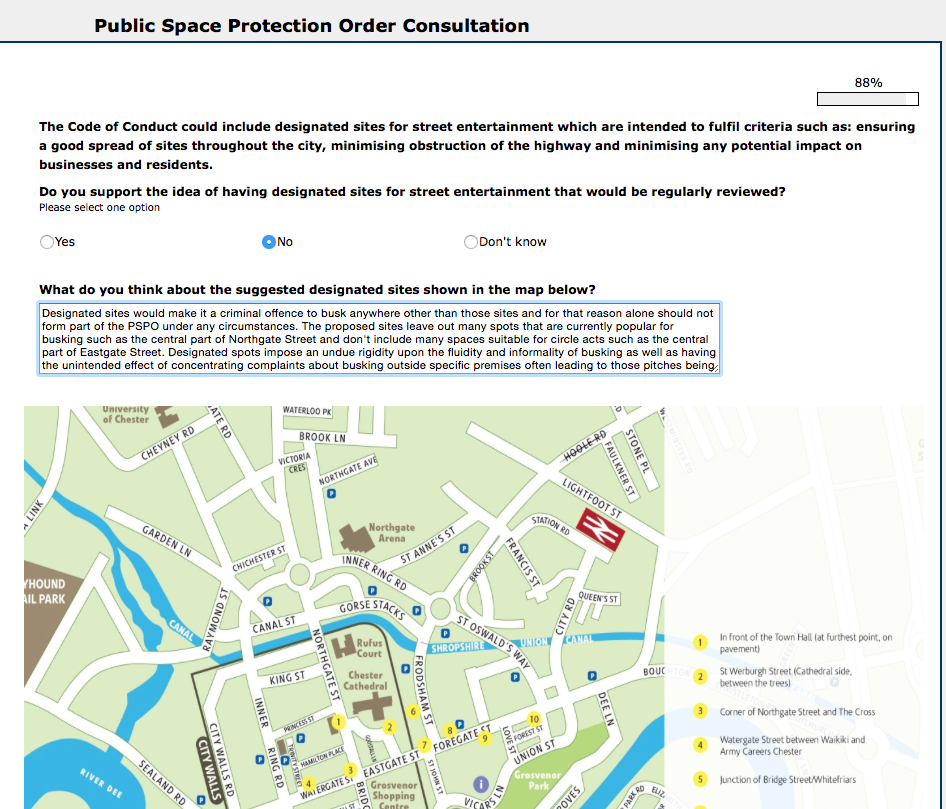
Designated Pitches
Text Summary
Designated sites would make it a criminal offence to busk anywhere other than those sites and for that reason alone should not form part of the PSPO under any circumstances. The proposed sites leave out many spots that are currently popular for busking such as the central part of Northgate Street and don’t include many spaces suitable for circle acts such as the central part of Eastgate Street. Designated spots impose an undue rigidity upon the fluidity and informality of busking as well as having the unintended effect of concentrating complaints about busking outside specific premises often leading to those pitches being closed down and even less pitches becoming available. Instead of designating fixed pitches the code of practise should make clear that busking is allowed in public places provided that a) No obstruction is being caused b) the performer is mindful of surrounding premises and other users of the street and makes approbate adjustments to their act upon reasonable request. Enforcement action should be directed only at performers whose actions are causing a genuine nuisance and who subsequently refuse to comply with a reasonable request to adjust their performance.
Page 14

Final Comments
Text Summary
The PSPO proposal is a fundamentally misconceived attempt to deal with specific issues such as the widespread disruption caused to Chester on certain Race Days in a catch-all fashion. It wrongly conflates busking, rough sleeping and feeding birds with ‘antisocial behaviour’, a term which is expanding its meaning to incorporate ever greater spheres of human interaction. It targets the vulnerable and marginalised through its provisions on rough sleeping and begging. It targets the cultural and artistic community in its provisions on busking and creates new ‘criminal offences’ which send a damaging message to the UK and beyond about what Chester is like and what kind of city it is. The provisions on bird-feeding are silly as well as draconian and betray an over-regulatory mindset which overlooks the crucial principles of policing by consent, equality before the law and proportionality. The council and the police have the use of robust existing legislation such as the 1986 Public Order Act to deal with genuinely antisocial behaviour. It is already a criminal offence to be drunk or disorderly or to cause alarm, harassment and distress to other people. Under the Police, Crime and Antisocial Behaviour Act 2014 the police and local authority have additional powers to use Community Protection Notices (CPNs) against any person whose behaviour is unreasonable, persistent and having a detrimental effect on the quality of life of those in the community. Used as a last resort, the CPNs enable the police or local authority to either issue Fixed Penalty Notices or fines of up to £2500 against persons who breach them. A far better approach to dealing with antisocial behaviour in Chester would be firstly to separate activities like rough sleeping, begging, bird feeding, and busking from consideration altogether. it was wrong to include these categories in the first place. Secondly, for issues around drunkenness, legal highs, and alcohol the police and local authority should identify those persons whose persistent actions have caused alarm, harassment and distress to other people and targeted enforcement action against those individuals using existing powers. This targeted approach could be achieved by drawing up clear guidance for officers and public officials on how to engage with vulnerable people what the real priorities for enforcement really were. My feeling is that the PSPO approach is about administrative convenience above all else. If an activity is named on a PSPO it becomes an offence by default, even if it is not causing harm or inconvenience to any person. Fixed penalty notices of £100 could be issued to people for sleeping on benches, feeding birds, or singing songs. The fine could rise to £1000 and a criminal record if it goes to court. This punitive and disproportionate response will do little to improve genuine community safety and will come at the expense of freedom of expression and association, freedoms that are intrinsic to life in an open and democratic country. Unlike Fixed Penalty Notices under a PSPO, prosecutions under existing legislation or through the use of Community Protection Notices require the police and the local authority to gather evidence that the person being targeted has caused a genuine issue. This is a protection against arbitrary outcomes and the potential abuse of power. The police and the local authority have an essential role in upholding pubic safety. It is vital that their scare resources are directed towards activities that are genuinely harmful and impacting upon the community, rather than in a scattergun approach against rough sleepers, buskers and bird feeders. Nonetheless the PSPO consultation provides the local authority with a value opportunity to develop a code of practise for busking that has the consent and full participation of the busking community, to examine the provision of services to homeless people, and to develop clear guidance for engagement with vulnerable groups on the part of the local authority. it provides the city of Chester, and the surrounding areas with a valuable opportunity to reflect upon what kind of city it wishes to be; the kind of city where people are made to feel welcome and included, whether they are a wealthy tourist or an impoverished and vulnerably housed resident, or whether it wishes to be a city where people face a criminal record for singing songs in the street and where, at the time of national housing crisis and widespread cuts to hostels and benefits, it becomes a criminal offence to sleep rough. It is greatly to be hoped that the opportunity to reflect upon these issues created by the consultation results in the wholehearted rejection of any measures that would criminalise the vulnerable and damage the vibrant street culture that is such an important part of making Chester the wonderful city that it is.
End of Formal Response to Consultation
Summary
Thank you for taking the time to participate in Chester and Cheshire West’s PSPO consultation and to read the official Keep Streets Live Campaign response to it. The more people that can express their opposition to these proposals, the more chance we have of successfully challenging them. Please share this consultation response and our petition with anyone you think might share our concerns about the attack on civic freedoms in Chester.

